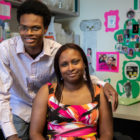Disparities
Strategic Outreach Bridging Racial Gap In Pregnancy-Related Health Outcomes
|
New Haven resident Kimberly Streater was pregnant with her third of six children when she called her friend for a ride to the hospital after sustaining a hit to her stomach by her then-husband. When she reached the hospital, Streater, not yet 28 weeks pregnant, alerted personnel that her baby was coming—now. “They said, ‘No, no, he’s not coming,’ after I told them he was,” she recalled. Minutes later, Howie was born at 3 pounds and 1.5 ounces in the admitting area of the hospital, just as Streater had predicted. Statistically, the preterm birth of Streater’s baby does not come as a surprise.
